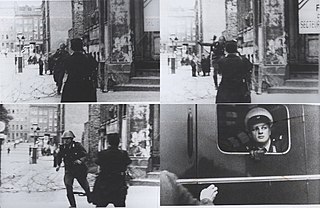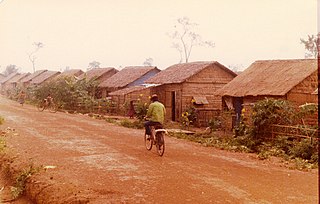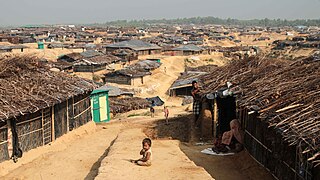The Office of the United Nations High Commissioner for Refugees (UNHCR) is a United Nations agency mandated to aid and protect refugees, forcibly displaced communities, and stateless people, and to assist in their voluntary repatriation, local integration or resettlement to a third country. It is headquartered in Geneva, Switzerland, and has 20,305 staff working in 136 countries as of December 2023.

A refugee, according to the United Nations High Commissioner for Refugees (UNHCR), is a person "forced to flee their own country and seek safety in another country. They are unable to return to their own country because of feared persecution as a result of who they are, what they believe in or say, or because of armed conflict, violence or serious public disorder." Such a person may be called an asylum seeker until granted refugee status by a contracting state or by the UNHCR if they formally make a claim for asylum.

The International Rescue Committee (IRC) is a global humanitarian aid, relief, and development nongovernmental organization. Founded in 1933 as the International Relief Association, at the request of Albert Einstein, and changing its name in 1942 after amalgamating with the similar Emergency Rescue Committee, the IRC provides emergency aid and long-term assistance to refugees and those displaced by war, persecution, or natural disaster. The IRC is currently working in about 40 countries and 26 U.S. cities where it resettles refugees and helps them become self-sufficient. It focuses mainly on health, education, economic wellbeing, power, and safety.

A refugee camp is a temporary settlement built to receive refugees and people in refugee-like situations. Refugee camps usually accommodate displaced people who have fled their home country, but camps are also made for internally displaced people. Usually, refugees seek asylum after they have escaped war in their home countries, but some camps also house environmental and economic migrants. Camps with over a hundred thousand people are common, but as of 2012, the average-sized camp housed around 11,400. They are usually built and run by a government, the United Nations, international organizations, or non-governmental organization. Unofficial refugee camps, such as Idomeni in Greece or the Calais jungle in France, are where refugees are largely left without the support of governments or international organizations.
The Orderly Departure Program(ODP) was a program to permit immigration of Vietnamese to the United States and to other countries. It was created in 1979 under the auspices of the United Nations High Commissioner for Refugees (UNHCR). The objective of the ODP was to provide a mechanism for Vietnamese to leave their homeland safely and in an orderly manner to be resettled abroad. Prior to the ODP, tens of thousands of "boat people" were fleeing Vietnam monthly by boat and turning up on the shores of neighboring countries. Under the ODP, from 1980 until 1997, 623,509 Vietnamese were resettled abroad of whom 458,367 went to the United States.

HIAS is a Jewish American nonprofit organization that provides humanitarian aid and assistance to refugees. It was established on November 27, 1881, originally to help the large number of Russian Jewish immigrants to the United States who had left Europe to escape antisemitic persecution and violence. In 1975, the State Department asked HIAS to aid in resettling 3,600 Vietnam refugees. Since that time, the organization continues to provide support for refugees of all nationalities, religions, and ethnic origins. The organization works with people whose lives and freedom are believed to be at risk due to war, persecution, or violence. HIAS has offices in the United States and across Latin America, Europe, Africa, and the Middle East. Since its inception, HIAS has helped resettle more than 4.5 million people.

Throughout the 20th century, Iraq witnessed multiple periods of instability and conflict that prompted the creation and flight of many refugees. Earlier examples include the exodus of Iraqi Jews and the flight of Iraqi Kurds. The Iraqi invasion of Iran in 1980 and the ensuing Iran–Iraq War (1980–1988) triggered a deterioration of ties among the country's various ethnic and religious communities, and also exacerbated in violent events like the Ba'athist Arabization campaigns in northern Iraq (1968–2003), which led to the killing and displacement of thousands of minorities. The Iraqi invasion of Kuwait (1990) and the ensuing Gulf War (1990–1991), which ended with Iraq's defeat and the application of United Nations sanctions (1991–2003), also resulted in the creation of many Iraqi refugees. It was not until the beginning of the ongoing Iraqi conflict, however, that sustained waves of Iraqi refugees would be created, numbering in the millions: the 2003 invasion of Iraq and the ensuing Iraq War (2003–2011) killed and displaced hundreds of thousands of Iraqis, both internally and externally, and the later War in Iraq (2003–2017) forced even more people to flee from the country. Many Iraqi refugees established themselves in urban areas of other countries rather than in refugee camps.

Roy L. Prosterman is Professor Emeritus of Law at the University of Washington and the founder of the Rural Development Institute (RDI), which changed its name to Landesa in January 2011. He is also active in the fields of land reform, rural development, and foreign aid. He has provided advice and conducted research in more than 40 countries in Asia, the former Soviet Union, Europe, the Middle East, and Latin America. Prosterman has received many awards and distinctions, the 2003 Gleitsman International Activist Award, a Schwab Foundation Outstanding Global Social Entrepreneur and more recently, the inaugural 2006 Henry R. Kravis Prize in Nonprofit Leadership where he was lauded as "Champion for the World's Poor". He has also been nominated for The World Food Prize, Conrad N. Hilton Humanitarian Prize, and Alcan Prize for Sustainability. Prosterman is a frequent guest speaker and presenter at world forums on poverty alleviation and is a frequent published author in nonfiction and fiction.

Palestinians in Iraq are people of Palestinians, most of whom have been residing in Iraq after they were displaced in 1948. Before 2003, there were approximately 34,000 Palestinians thought to be living in Iraq, mainly concentrated in Baghdad. However, since the 2003 Iraq War, the figure lies between 10,000–13,000, although a precise figure has been hard to determine. The situation of Palestinians in Iraq deteriorated after the fall of Saddam Hussein and particularly following the bombing of the Al-Askari Mosque in 2006. Since then, with the rise in insecurity throughout Iraq, they have been the target of expulsion, persecution and violence by Shia militants, and the new Iraqi Government with militant groups targeting them for preferential treatment they received under the Ba'ath Party rule. Currently, several hundred Palestinians from Iraq are living in border camps, after being refused entry to neighbouring Jordan and Syria. Others have been resettled to third countries.

Vietnamese boat people were refugees who fled Vietnam by boat and ship following the end of the Vietnam War in 1975. This migration and humanitarian crisis was at its highest in the late 1970s and early 1980s, but continued well into the early 1990s. The term is also often used generically to refer to the Vietnamese people who left their country in a mass exodus between 1975 and 1995. This article uses the term "boat people" to apply only to those who fled Vietnam by sea.

Refugee women face gender-specific challenges in navigating daily life at every stage of their migration experience. Common challenges for all refugee women, regardless of other demographic data, are access to healthcare and physical abuse and instances of discrimination, sexual violence, and human trafficking are the most common ones. But even if women don't become victims of such actions, they often face abuse and disregard for their specific needs and experiences, which leads to complex consequences including demoralization, stigmatization, and mental and physical health decay. The lack of access to appropriate resources from international humanitarian aid organizations is compounded by the prevailing gender assumptions around the world, though recent shifts in gender mainstreaming are aiming to combat these commonalities.
Refugees of the Syrian civil war are citizens and permanent residents of Syria who have fled the country in the course of the Syrian civil war. The pre-war population of the Syrian Arab Republic was estimated at 22 million (2017), including permanent residents. Of that number, the United Nations (UN) identified 13.5 million (2016) as displaced persons in need of humanitarian assistance. Since the start of the Syrian civil war in 2011 more than six million (2016) were internally displaced, and around five million (2016) crossed into other countries, seeking asylum or placement in Syrian refugee camps. It is believed to be one of the world's largest refugee crises.
Rose Mapendo is a Congolese human rights activist. She founded the Rose Mapendo Foundation with the mission to empower the women of the Democratic Republic of Congo, Rwanda, and Burundi to rise above their circumstances and unite to bring peace to their region.

The Cambodian humanitarian crisis from 1969 to 1993 consisted of a series of related events which resulted in the death, displacement, or resettlement abroad of millions of Cambodians.
Mangala Sharma is a human and women's rights activist and the first winner of the Ginetta Sagan Fund Award in 1997. She was exiled from the country in March 1992 after being outspoken against the government's "One Nation, One People" policy and their discrimination against ethnic minorities, known as Lhotshampas. Since her exile, she has formed the Bhutanese Refugees Aid for Victims of Violence (BRAVE), a self-help organization dedicated to assisting affected refugees from Bhutan. BRAVE facilitates counseling and training in all eight of the Bhutanese refugee camps in Nepal. In 1995 Sharma took some of the women refugees to Beijing, China to the International Women Conference. There she got help from the United States Government, the United Nations and the Australian Government.

Global Refuge, formerly known as Lutheran Immigration and Refugee Service, is a non-profit organization that supports refugees and migrants entering the United States. It is one of nine refugee resettlement agencies working with the Office of Refugee Resettlement and one of two that serves unaccompanied refugee minors. Global Refuge also advocates for policies and practices relating to immigration and detention.

In 2015, hundreds of thousands of Rohingya people were forcibly displaced from their villages and IDP camps in Rakhine State, Myanmar, due to sectarian violence. Nearly one million fled to neighbouring Bangladesh and some travelled to Southeast Asian countries including Malaysia, Indonesia, Cambodia, Laos and Thailand by rickety boats via the waters of the Strait of Malacca, Bay of Bengal and the Andaman Sea.

Lionel Alexander Rosenblatt is a former American diplomat, Refugee Coordinator at the United States Embassy in Thailand, and President of Refugees International, an advocacy organization for refugees. Rosenblatt was one of the foremost advocates for resettling Indochinese refugees in the United States during the 1970s and 1980s.
Heidy Quah is a Malaysian social rights advocate. She is the founder and chief of Refuge for the Refugees, a non-profit organization that aims to raise awareness on the pressing conditions of refugees and provide them support. She was the first Malaysian woman to receive the Queen's Young Leader Award.
The British Committee for Refugees from Czechoslovakia (BCRC), later the Czechoslovak Refugee Trust Fund, was a non-governmental organisation established in Prague in late September 1938, in the lead up to the Second World War, in response to the large number of refugees fleeing areas under control of Nazi Germany. Its purpose was to give humanitarian aid to refugees and resettle some of them in the United Kingdom or other countries. The BCRC aided political refugees, especially Social Democrats and communists, as well as Jews and their families, who fled Nazi Germany or the regions it annexed during 1938. The BCRC was initially funded by public donations and appeals following the Munich Agreement in September 1938 and ensuing German occupation of the Sudetenland. In January 1939 the British government gave four million pounds sterling to Czechoslovakia for assistance to refugees and their resettlement in other countries.













